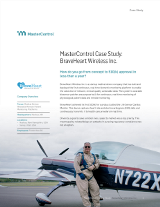
GxP Lifeline
Aviator Proves the Sky Is Not the Limit for Life-Changing Innovation
An airplane hangar at a small airport in Nashua, New Hampshire is equipped with communications gear, maps, toolboxes, airplane parts and, of course, an airplane. The building also uniquely includes a research and development laboratory and executive offices for startup medical device company BraveHeart Wireless Inc.
Who is BraveHeart?
A startup venture is the embodiment of innovation. Often startups hit the ground running with little more than an idea, a vision and the drive to create something monumental. With all these aspects and a goal to save a million lives, BraveHeart Wireless Inc. is the very definition of a successful startup company.
BraveHeart has developed and deployed the Life Sensor Cardiac Monitor, which is the first continuous, real-time biometric monitoring platform to enable the collection of actionable, clinical-quality data. It includes wearable biosensor patches that are purpose-built for continuous, real-time monitoring of heart rate and electrocardiogram (EKG) data, which is continuously transmitted to health care providers. BraveHeart earned a 510(k) for this device within one year of putting the idea on the drawing board.
Filling a Need
How to get critical data to health care professionals anytime, from anywhere and faster.
As an aviator, Steve McCalmont undergoes an annual, Federal Aviation Administration (FAA)-mandated physical examination. A stress test is required as part of the physical, which entails being tethered to an electrocardiogram (ECG or EKG) machine by a myriad of electrodes and attempting to run on a treadmill.
During one of his stress tests, McCalmont’s entrepreneurial mind immediately kicked in and he started giving thought to how biometric data gathering could be done remotely and without so many tentacles. The idea for the Life Sensor Cardiac Monitor was born.
“Suddenly, gathering an array of vital information from a patient in virtually any environment is feasible and much easier,” he explained.
Building a Device in a Quality-Driven Culture
Given the complexity of medical device regulatory submissions, BraveHeart’s business model includes details for how quality and compliance processes are built into every phase of product design, manufacturing, testing and postmarket usage. The BraveHeart team recognizes the value of meeting, and even exceeding, regulatory quality standards. This means a quality mindset is embedded in the company’s culture.
“Setbacks due to compliance issues are extremely difficult to recover from. Incorporating quality early is important,” said Ralph Beck, vice president of software. “Putting quality procedures in later can become a multi-year process to get everything in place to become compliant.”
Airplane Preflight Check Exemplifies Quality in Med Device Design
Any pilot will likely concur that the most important part of a flight is the preflight check. This involves a detailed visual inspection of the airplane. “I’m sure before the Wright Brothers first took off, Orville or Wilbur had a preflight checklist someplace,” McCalmont said. “That’s how they survived.”
With air travel, the slightest deviation in an airplane’s mechanics or functionality can potentially keep the aircraft on the ground. The same goes for a medical device. Any deviations or shortcomings in quality, safety and efficacy can prevent it from achieving compliance.
What Quality Means to BraveHeart
Quality goes beyond checking boxes. “Regulatory guidelines are an entry point for compliance, but quality is about much more than the regulatory environment,” said Dave Shimkus, vice president of operations. “Quality is about improving patient experiences and outcomes.”
A focus on quality is embraced by every member of the BraveHeart team. “You can’t go back,” said McCalmont. “We are on an aggressive schedule. We have to do it right, and we have to do it right the first time.”
BraveHeart Wireless Inc. is the perfect example of how high a company can soar when quality is built into the production process.

